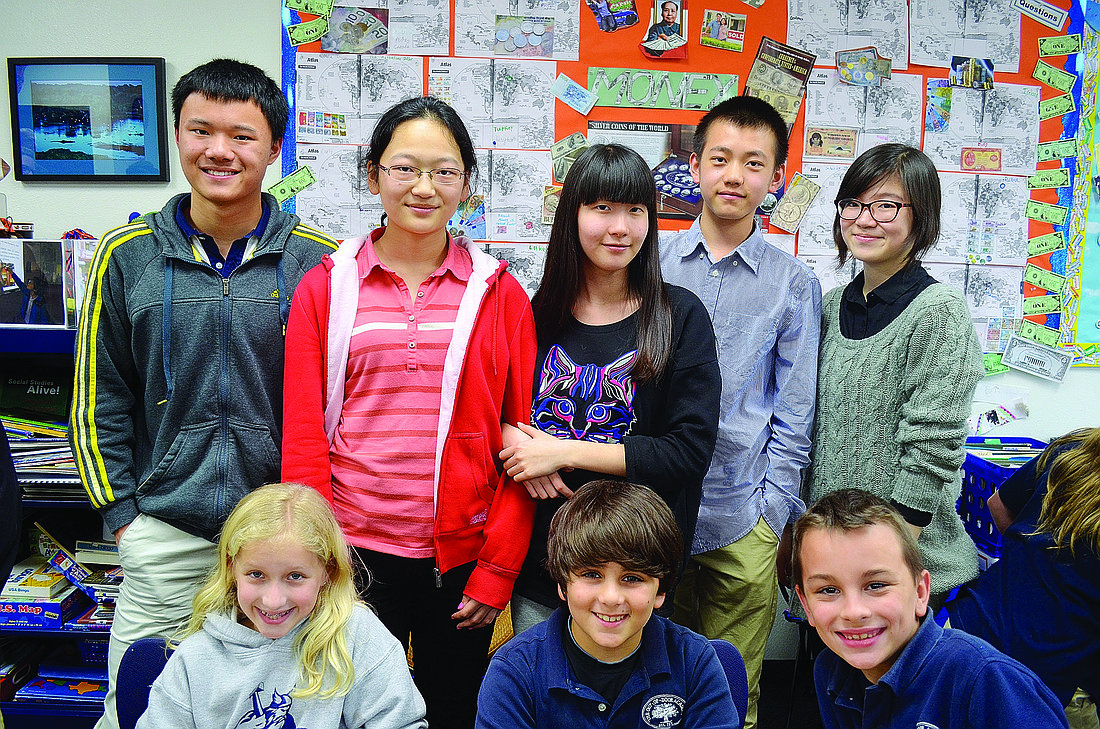- January 4, 2025
-
-
Loading

Loading

LAKEWOOD RANCH — During the first few days of his stay in a country foreign, 16-year-old Jeffrey Qiu looked forward to his nightly FaceTime video-conference conversations with his parents.
More than 7,600 miles away from his hometown of Beijing, Qiu enjoyed the sight of the only familiar faces — besides those of his classmates who also made the trip to the United States — he had seen since he left China a few days before.
From Jan. 12 to Feb. 5, The Out-of-Door Academy upper school’s faculty and students hosted five students and a teacher from Beijing High School No. 4 as part of an exchange student agreement between the two schools.
Qiu, along with fellow 16-year-olds Frank Liao, Liz Zhuo, Tina Shibano and Cheyenne Zhang, under the guidance of John McVay, a teacher at the students’ high school, immersed themselves in the American high-school student lifestyle.
They participated in set class schedules and in daily classroom activities with ODA students.
When they weren’t doing homework or spending time with their host families, the students, who attended ODA as sophomores, participated in weekly activities, such as touring the Ringling Museum of Art and riding on an airboat in the swamps of Myakka.
“I love it here, so much,” Zhang said. “I never want to leave.”
The students, who attend school 11 months out of the year, with only one month off to observe the Chinese New Year, chose to spend their free time here, attending classes.
The monthlong stay in the area plays a small piece in the overall puzzle; the students hope later to attend college in the United States.
In 2012, ODA parent Derek Han visited Beijing for a performance-arts conference. While on the trip, Han received a call from the headmaster of ODA, David Mahler, who had been contacted by a representative of Beijing High School No. 4 about Chinese students visiting ODA.
Han met with students at the high school and relayed positive reviews of an institution he cites as having more difficult and stricter admittance requirements than Harvard University, and that sends more than 150 students to the United States each year; it seemed like a good match for the local college-preparatory school.
For the second year, interested faculty members, students and their families provided homes for the visiting students during their four weeks in the country.
While group members enjoy the opportunity to spend time with children their own age and learning what their hobbies and interests are outside of school, the real intrigue comes from the classroom.
“It’s so alive here and so free in class,” Liao said. “In China, the teacher keeps talking and talking; there’s much less discussion with students.”
The group enjoys the “Socratic method” of teaching ODA Director of Collaborative Learning Education Outreach Camela Giraud believes the school practices. Beijing schools focus more on lecture-style discussions, rather than group work and student input, she said.
On the other side of the educational spectrum sits McVay — an advanced placement economics teacher in Beijing. A Mississippi native, McVay moved to China 13 years ago to pursue his “later-in-life dream” of becoming an educator.
With his Southern accent, McVay surprised the ODA staff members with his fluent Chinese language skills. They “didn’t see that coming,” they said, upon first hearing his voice.
McVay was excited to come to ODA this year, after not having visited his homeland in a few years, and to observe the differences in American classrooms versus those in Beijing.
“In traditional Chinese classrooms, there’s more sitting and listening,” McVay said. “There’s less focus on critical and independent thinking and more emphasis on memorization.”
As Qiu packed his belongings and thought back to the slightly homesick first few days in the building that later became more of a home, he looked forward to coming back in the future.
“I just, just can’t limit this experience to words,” Qiu said.
Contact Amanda Sebastiano at [email protected].